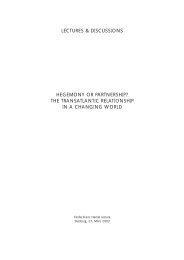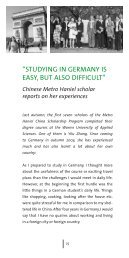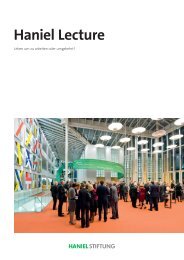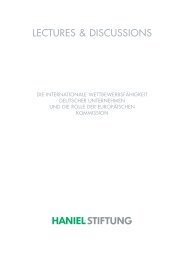Haniel Lecture 09 2010 E.pdf - Haniel Stiftung
Haniel Lecture 09 2010 E.pdf - Haniel Stiftung
Haniel Lecture 09 2010 E.pdf - Haniel Stiftung
Create successful ePaper yourself
Turn your PDF publications into a flip-book with our unique Google optimized e-Paper software.
22 | Friedrich Merz<br />
“We have committed our state to coshape,<br />
co-fund and thereby enable families<br />
to strike this work-life balance; a commitment<br />
that seriously overtaxes this<br />
state, from an objective point of view.”<br />
Therefore, my fourth thesis is: we have committed our state to coshape,<br />
co-fund and thereby enable families to strike this work-life<br />
balance; a commitment that seriously overtaxes this state, from an<br />
objective point of view. We are guided by gender equality aims that<br />
not only lead to increasing state indebtedness but also to greater<br />
social spending. We are also tempted to take away individual<br />
responsibility from people who actually have a diff erent attitude.<br />
This theory is not new. Alexis de Tocqueville once wrote that, “When<br />
inequality of conditions is the common law of society, the most<br />
marked inequalities do not strike the eye; when everything is nearly<br />
on the same level, the slightest are marked enough to hurt it”. He<br />
goes on to say, “Hence the desire of equality always becomes more<br />
insatiable in proportion as equality is more complete”. The overtaxing<br />
of our social welfare state is closely related to this fact.<br />
This is why I maintain that throwing more money at the social<br />
welfare state will not solve more problems, but actually create<br />
additional problems. I would even go one step further and say that<br />
we, the state, public households spend more money on families in<br />
<strong>2010</strong> than we have ever spent before. There are probably around<br />
80 sources of funding available to families, from child benefi t<br />
through to health provision. We have relied too heavily on transfer<br />
payments and too little on the internal responsibility of the smallest<br />
social unit of our country, and that is the family. In the lecture<br />
given by Ronald Heifetz, we heard a completely diff erent basic<br />
attitude towards the relationship between the state and society<br />
and self-responsibility than we have ever managed to develop in<br />
our social welfare states in Europe over decades. So, what conclusion<br />
should be drawn?<br />
My fi fth thesis is that simple anti-capitalism has failed in providing<br />
answers to these questions. It has always known what it did<br />
not want and has rightly pointed to some drawbacks and excesses<br />
that exist. But the task of striking a new balance between the<br />
state and its citizens still exists and, from a European perspective,<br />
is more pressing than ever. Many of the things that Ronald Heifetz<br />
mentioned in his lecture are transferrable to us. I will touch on<br />
two major tasks. First of all, I would like to mention corporate<br />
social responsibility for employees. There has been a great deal of<br />
positive discussion surrounding this issue for many years now and<br />
many things have been done right. But are we doing enough? Is<br />
it enough to simply feel social responsibility towards employees?<br />
Shouldn’t we be thinking instead about initiating completely different<br />
forms of organising work?<br />
Again, let me give you a personal example. When I was still an<br />
active politician, I was invited every year to speak at various New<br />
Year’s Eve receptions. I was invited to one a couple of years ago<br />
by a company in the Swabian Alps. This traditional, family-run<br />
mechanical-engineering company had just proudly inaugurated a<br />
new offi ce building, in which there was not only a canteen, but<br />
also a company-run crèche right next to it. During my visit, many<br />
employees proudly told me that they are now able to at least have<br />
lunch together with their children. Why not take a leaf out of their<br />
book and imitate this example?<br />
I also came to learn in the meantime that we have major problems<br />
in recognising company-run crèches for tax purposes. But if we<br />
have the commuter tax rebate and the second home and advertising<br />
costs or whatever they’re called that are tax deductible, then<br />
the state should also make company-run crèches tax deductible.<br />
They are useful and also, as the example I’ve just mentioned demonstrates,<br />
a tool to enable families to achieve a work-life balance.<br />
It must be possible to come up with other forms of organisation in<br />
companies, and perhaps we should start with medium-sized companies<br />
that still have strong ties with the region and the city in<br />
which they are based.











